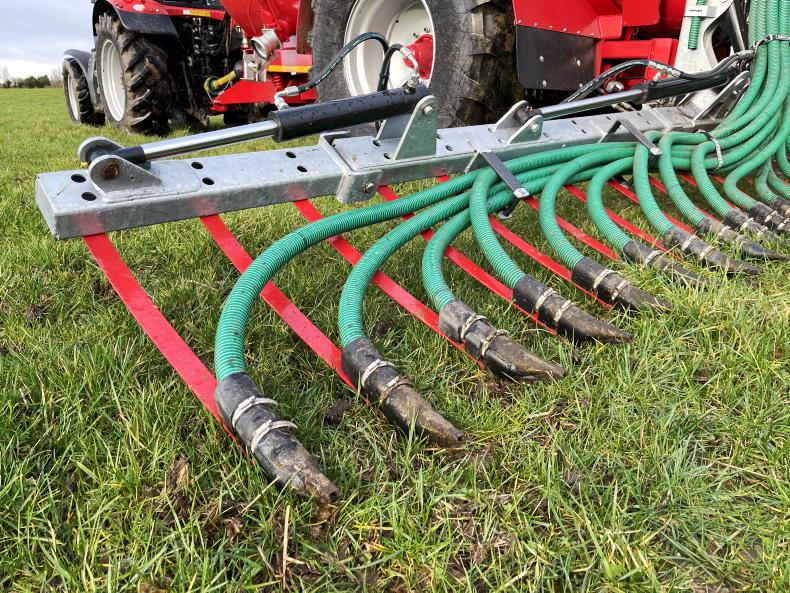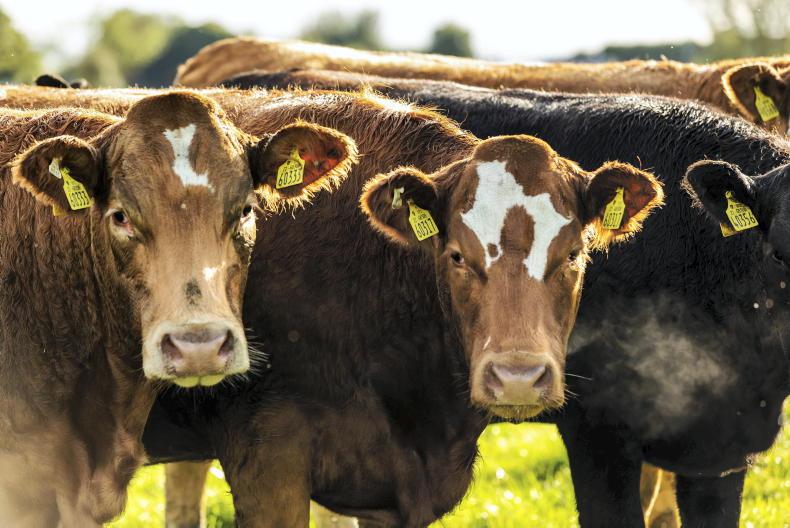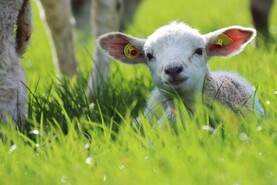It has been three long years since we have welcomed farmers in through the gates of Tullamore Farm.
A lot has taken place since 2019 that we aim to show on the open day on 26 July.
At the beginning of this project in 2017, we gave an undertaking to tell the full story of what happens on a day-to-day basis on Tullamore Farm.
We have got some things right and some things wrong and this has posed challenges along the way.
Infertile bulls, tetany issues, listeriosis, drought in 2018, Storm Emma, poor scanning rates have all occurred and been dealt with.
In telling this story we hope we have helped others deal with similar challenges.
The farm has hosted many groups of farmers, both local and international, over the years, albeit 2020 and 2021 was much quieter than other years due to the COVID-19 pandemic.
The farm is also an important hub for the livestock team during the year.
The purpose of the farm is to demonstrate best practice inside the farm gate and also show beef and sheep farmers how good technical efficiency can improve farm profitability.
The farm is leased from the Grogan family on a standard 15-year lease (2017-2031). The rental cost is €140/acre, with the Grogan family holding on to the single farm payment. Other livestock or environmental related payments like the ANC payment, the ewe payment, BDGP, BEEP –S or environmental schemes will remain with Tullamore Farm Ltd.
There is a 60:40 split between Tullamore Farm Ltd and the Grogan family on any capital expenditure incurred on farm.
Finance
The farm management team works closely with ifac specialists in analysing the farm accounts.
The farm is in the unique position of paying full rent, full labour, and interest on borrowed money without any single farm payment.
This means making ends meet at the end of the year is very difficult and highlights how important CAP and farm support packages are to the survival of drystock farms in the future.
Farm management
Shaun Diver is the full-time farm manager and is tasked with running the farm on a day-to-day basis with support from the Irish Farmers Journal livestock team.
The farm also employs extra help during peak periods during the year and takes in students during the lambing and calving period.
The farm system
The farm is trying to follow best-practice principles and built around the idea that high grass utilisation, high animal performance and optimal stocking rates will lead to higher profitability in a drystock system.
The suckler system is built around a high replacement index spring-calving cow, irrespective of breed with the aim being to:
Breed high-quality, high replacement index, high health status heifers suitable as replacements for the suckler herd.Produce high-quality male progeny that will finish as U grade under 16 month bull beef.Open day detail
On the day, gates will open at 10.30am and on arrival visitors will walk the open day route taking in stands and talks from Irish Farmers Journal specialists on the farm’s financial performance in 2021, breeding and animal performance on the farm, the sheep system performance, grassland management which will include details on our multispecies and red clover swards and how we will incorporate these new swards into our management system in the future.

We have been working closely with the Irish Farmers Journal sustainability specialist Siobhan Walsh on how we can hit our sustainability targets and improve biodiversity on Tullamore Farm.
Soil fertility will be covered in detail by Andy Doyle and we will also static stands on animal health, machinery maintenance, health and safety, beef research and much more in the yard area.
Food and refreshments will also be available in the yard area during the day.
It has been three long years since we have welcomed farmers in through the gates of Tullamore Farm.
A lot has taken place since 2019 that we aim to show on the open day on 26 July.
At the beginning of this project in 2017, we gave an undertaking to tell the full story of what happens on a day-to-day basis on Tullamore Farm.
We have got some things right and some things wrong and this has posed challenges along the way.
Infertile bulls, tetany issues, listeriosis, drought in 2018, Storm Emma, poor scanning rates have all occurred and been dealt with.
In telling this story we hope we have helped others deal with similar challenges.
The farm has hosted many groups of farmers, both local and international, over the years, albeit 2020 and 2021 was much quieter than other years due to the COVID-19 pandemic.
The farm is also an important hub for the livestock team during the year.
The purpose of the farm is to demonstrate best practice inside the farm gate and also show beef and sheep farmers how good technical efficiency can improve farm profitability.
The farm is leased from the Grogan family on a standard 15-year lease (2017-2031). The rental cost is €140/acre, with the Grogan family holding on to the single farm payment. Other livestock or environmental related payments like the ANC payment, the ewe payment, BDGP, BEEP –S or environmental schemes will remain with Tullamore Farm Ltd.
There is a 60:40 split between Tullamore Farm Ltd and the Grogan family on any capital expenditure incurred on farm.
Finance
The farm management team works closely with ifac specialists in analysing the farm accounts.
The farm is in the unique position of paying full rent, full labour, and interest on borrowed money without any single farm payment.
This means making ends meet at the end of the year is very difficult and highlights how important CAP and farm support packages are to the survival of drystock farms in the future.
Farm management
Shaun Diver is the full-time farm manager and is tasked with running the farm on a day-to-day basis with support from the Irish Farmers Journal livestock team.
The farm also employs extra help during peak periods during the year and takes in students during the lambing and calving period.
The farm system
The farm is trying to follow best-practice principles and built around the idea that high grass utilisation, high animal performance and optimal stocking rates will lead to higher profitability in a drystock system.
The suckler system is built around a high replacement index spring-calving cow, irrespective of breed with the aim being to:
Breed high-quality, high replacement index, high health status heifers suitable as replacements for the suckler herd.Produce high-quality male progeny that will finish as U grade under 16 month bull beef.Open day detail
On the day, gates will open at 10.30am and on arrival visitors will walk the open day route taking in stands and talks from Irish Farmers Journal specialists on the farm’s financial performance in 2021, breeding and animal performance on the farm, the sheep system performance, grassland management which will include details on our multispecies and red clover swards and how we will incorporate these new swards into our management system in the future.

We have been working closely with the Irish Farmers Journal sustainability specialist Siobhan Walsh on how we can hit our sustainability targets and improve biodiversity on Tullamore Farm.
Soil fertility will be covered in detail by Andy Doyle and we will also static stands on animal health, machinery maintenance, health and safety, beef research and much more in the yard area.
Food and refreshments will also be available in the yard area during the day.







 This is a subscriber-only article
This is a subscriber-only article










SHARING OPTIONS: